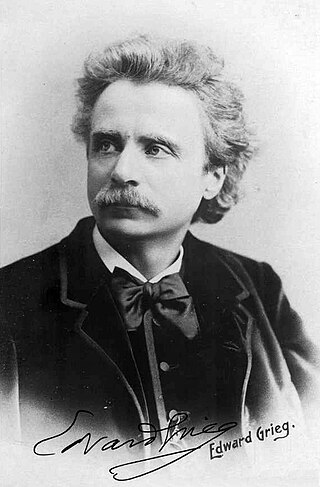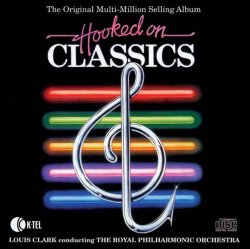
Edvard Hagerup Grieg was a Norwegian composer and pianist. He is widely considered one of the leading Romantic era composers, and his music is part of the standard classical repertoire worldwide. His use of Norwegian folk music in his own compositions brought the music of Norway to fame, as well as helping to develop a national identity, much as Jean Sibelius did in Finland and Bedřich Smetana in Bohemia.

The Piano Concerto in A minor, Op. 16, composed by Edvard Grieg in 1868, was the only concerto Grieg completed. It is one of his most popular works, and is among the most popular of the genre. Grieg, being only 24 years old at the time of the composition, had taken inspiration from Robert Schumann's only concerto, also being in A minor.

The Piano Concerto in A minor, Op. 54, by the German Romantic composer Robert Schumann was completed in 1845 and is the composer's only piano concerto. The complete work was premiered in Dresden on 4 December 1845. It is one of the most widely performed and recorded piano concertos from the Romantic period.

Lyric Pieces is a collection of 66 short pieces for solo piano written by Edvard Grieg. They were published in 10 volumes, from 1867 to 1901. The collection includes several of his best known pieces, such as Wedding Day at Troldhaugen, To Spring, March of the Trolls (Trolltog), and Butterfly (Sommerfugl).
Norwegian composer Edvard Grieg wrote three violin sonatas. They are all examples of his musical nationalism, since they all contain references or similarities to Norwegian folk song. Grieg wrote the sonatas between 1865 and 1887.
Edouard van Remoortel was a Belgian conductor. He studied cello and conducting at the Brussels conservatory. He was affiliated with the Belgian National Orchestra as of 1951.

Beyond Nature is the title of a 1991 instrumental album by guitarist Phil Keaggy.
The Holberg Suite, Op. 40, more properly From Holberg's Time, subtitled "Suite in olden style", is a suite of five movements based on eighteenth-century dance forms, written by Edvard Grieg in 1884 to celebrate the 200th anniversary of the birth of Dano-Norwegian humanist playwright Ludvig Holberg (1684–1754).
Sigurd Jorsalfar is a work of incidental music composed by Edvard Grieg for a play by Bjørnstjerne Bjørnson celebrating King Sigurd I of Norway. Published as Op. 22, it was first performed in Christiania on 10 April 1872. An orchestral suite compiled by Grieg from the main work and published as Op. 56 was premiered in Oslo on 5 November 1892 and revised by the composer the same year.

Peer Gynt, Op. 23, is the incidental music to Henrik Ibsen's 1867 play Peer Gynt, written by the Norwegian composer Edvard Grieg in 1875. It premiered along with the play on 24 February 1876 in Christiania.
The String Quartet No. 14 in A♭ major, Op. 105, B. 193, was the last string quartet completed by Antonín Dvořák, even though it was published before his String Quartet No. 13. Dvořák finished his Fourteenth Quartet in 1895, when he had returned to Bohemia after his visit to America. The gestation of the Quartet had actually begun in America and lasted six months, which was rather protracted for the composer. This Quartet marked an important point in Dvořák's development because he would devote himself almost exclusively to writing explicit program music, namely symphonic poems and operas, afterwards.
In Autumn, Op. 11, is a concert overture written by Edvard Grieg in 1865.
Edvard Grieg composed the Cello Sonata in A minor, Op. 36 for cello and piano, and his only work for this combination, in 1882–83, marking a return to composition following a period when he had been preoccupied with his conducting duties at the Bergen Symphony Orchestra as well as illness.
Edvard Grieg's Piano Sonata in E minor, Op. 7 was written in 1865 when he was 22 years old. The sonata was published a year later and revised in 1887. The work was Grieg's only piano sonata and it was dedicated to the Danish composer Niels Gade. The sonata has four movements with the following tempo markings:
- Allegro moderato
- Andante molto
- Alla Menuetto, ma poco più lento
- Finale: Molto allegro
Ballade in the Form of Variations on a Norwegian Folk Song in G minor, Op. 24, is a large-scale work for piano by Edvard Grieg. It is in the form of theme and variations, the theme being the Norwegian folk song Den nordlanske bondestand. A performance usually lasts around 20 minutes.

August Winding was a Danish pianist, teacher and composer.

The 50 Greatest Pieces of Classical Music is a selection of classical works recorded by the London Philharmonic Orchestra with conductor David Parry. Recorded at Abbey Road Studios, Royal Festival Hall and Henry Wood Hall in London, the album was released in digital formats in November, 2009 and as a 4-CD set in 2011. The 50 Greatest Pieces of Classical Music has sold over 200,000 copies and spent over three days as one of the top 10 classical albums on iTunes.
Edvard Grieg's String Quartet No. 1 in G minor, Op. 27, is the second of three string quartets written by the composer. The first, in D minor, was an early work, now lost, written in the early 1860s at the request of his teacher, Carl Reinecke. The third quartet, in F major, remained incomplete at the composer's death.

Hooked on Classics, produced by Jeff Jarratt and Don Reedman, is a multi-million selling album recorded by Louis Clark and the Royal Philharmonic Orchestra, published in 1981 by K-tel and distributed by RCA Records, part of the Hooked on Classics series.








